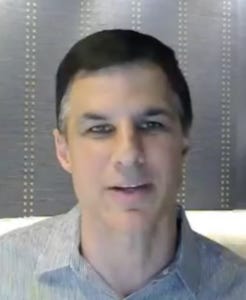A BROADWAY MAVERICK CONTEMPLATES A POST-COVID FUTURE: INTERVIEW
Producing theater is quixotic in the best of circumstances. Weathering the industry's longest-ever shutdown, which has halted shows and cut off incomes, makes the endeavor that much more daunting.
"Cameron Mackintosh has said, ‘theater has always survived on mavericks who go their own way,’ and we need more of them out there," producer Ken Davenport said in a Zoom interview earlier this week from his Upper West Side apartment.
"I'm worried that there may be a thinning of the independent producers, who were doing this and it was challenging and they're like, 'why?' Why am I going to keep doing this if this is so hard?"

Davenport on his live stream
The coronavirus has brought the Broadway business to a stop -- and in many cases, to its knees -- as the shutdown has affected not only shows running, but many more in development. Davenport has four new musicals in the works, including an adaptation of the 1983 movie National Lampoon's Vacation. He considers himself lucky that he didn't have a show running in New York when theaters went dark on March 12.
Among his many side gigs, Davenport interviews producers, composers, playwrights, designers, directors and other theater makers for his invaluable Producer's Perspective podcast. This week, he started Producer's Perspective Live, a nightly, DIY video talk show that also promotes the emergency relief work by the Actors Fund. We spoke shortly before the appearance of his first guest, Stephen Schwartz, the composer and lyricist of, among others, Godspell, the inaugural musical that Davenport lead produced. (Davenport went on to win a Tony Award in 2018 for the musical revival of Once on This Island.)
How did the video show come about?
I was checking in on with some of my friends, doing our own virus wellness checks, if you will. All of a sudden all these incredible theater people were making me feel better. We started laughing and we had a little fun and it reminded me of why I love theater people.
So I reached out to them and said, 'I know we just talked, but what do you think about doing something with me?' I think it's essential that people gather in whatever way they can right now. It’s a primal human need to connect with other people.
Out-of-work actors justifiably have been getting a lot of attention. What about independent producers, general managers?
I don't think there is a person in the world who isn’t affected. It certainly is hitting me and my company. We had two tours close. There are so many co-producers and producers out there with shows running. We're blessed that we didn't have a show running because that's immediate income that people plan for. I've been concerned about the independent producer for a long time because in the age of fewer theaters and more corporations, how does an independent producer get traction?
What's your life like now?
There's always work to be done. I've got four musicals set to make their debuts in the next 12 to 14 months: Broadway Vacation, Harmony [by Barry Manilow and Bruce Sussman], the Neil Diamond musical and Joy [based on the life of entrepreneur Joy Mangano]. Now that's shifting a bit. We were going to do a workshop of the Neil Diamond musical [on May 1] and we can't do that now. Well, what else can we do? Let's dig into the artwork. Let's see what research we can do. Things that will hopefully get us ahead of the game later because when this curtain is lifted, when those gates fly open, it is going to be a rush to get things up and going again.
How difficult is it to deal with the disruption?
Of course it's difficult, but there is nothing you can do. This is not like one actor getting sick or a director saying, my schedule is too busy. This delay affects the entire freaking world. I need to produce. The advice I have for people is that if their current situation is not allowing you to do what you love, figure out another way. You want to be creating stuff.
I'm scheduling a virtual reading for Broadway Vacation. We're going to the authors online and a couple of others, just read the script together. It'll be awkward and bad at times. That's not the way these things are meant to be done. But we'll learn something.
How big a role will insurance play for shows that went dark?
It's about business interruption insurance and what the fine print was. Those insurance companies are going to get beat the hell up, with requests from all over and every industry. It's going to be a very interesting time to see how it all shakes out and if insurance comes through and I cross my fingers that it does for a lot of shows. But it's not going to save a show.
Is this the end of the Broadway boom?
Oh yeah, it’s going to take a massive bite out of the business. I think the boom is definitely over. The question is, is how quickly it bangs back. And it will, and then some. One day we'll look back at this like we look back at the dark period of the '80s, or post-9/11, or the financial crisis in 2008, and say, 'Can you believe where we are now compared to where we were then?'
And I'm doing everything I can, including getting producers like Kevin McCollum [on April 5] and writers like Jeanine Tesori [April 4] and actors like Jason Alexander [April 13] on my live stream, to make sure they say to every theater maker out there, ‘don’t give up the fight.’
This interview was edited and condensed.


